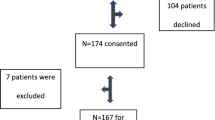Abstract
Limited health literacy is a significant risk factor for adverse health outcomes. Despite controversy, many health care professionals have called for routine clinical screening of patients’ literacy skills. Whereas brief literacy screening tools exist that with further evaluation could potentially be used to detect limited literacy in clinical settings, no screening program for limited literacy has been shown to be effective. Yet there is a noted potential for harm, in the form of shame and alienation, which might be induced through clinical screening. There is fair evidence to suggest that possible harm outweighs any current benefits; therefore, clinical screening for literacy should not be recommended at this time.
Similar content being viewed by others
References
Dewalt DA, Berkman ND, Sheridan S, Lohr KN, Pignone MP. Literacy and health outcomes: a systematic review of the literature. J Gen Intern Med. 2004;19:1228–39.
Institute of Medicine. Health literacy: A prescription to end confusion. In: Nielsen-Bohlman L, Panzer A, Kindig DA, eds. Washington, D.C., National Academies Press, 2004.
Berkman N, Pignone MP, DeWalt D, Sheridan S. Health literacy: Impact on Health Outcomes. Evidence Report/Technology Assessment. Rockville, MD:AHRQ, 2004.
Ad Hoc Committee on Health Literacy, American Medical Association Council on Scientific Affairs. Health literacy: report of the Council on Scientific Affairs. JAMA. 1999;281:552–7.
Joint Commission for the Accreditation of Hospital Organization (JCAHO). What Did the Doctor Say? Improving Health Literacy to Protect Patient Safety. Health Care at the Crossroads Report. Oakbrook, IL, 2007. February.
Pignone M, DeWalt DA, Sheridan S, Berkman N, Lohr KN. Interventions to improve health outcomes for patients with low literacy. A systematic review. J Gen Intern Med. 2005;20:185–92.
Bass PF 3rd, Wilson JF, Griffith CH. A shortened instrument for literacy screening. J Gen Intern Med. 2003;18:1036–8.
Wolf MS, Heckinger EA, Arozullah A, et al. Identifying persons with poor health literacy in 7 seconds: an important adjunct to improving cancer screening and treatment. J Clin Oncol 2004;22(14S):6007.
Weiss BD, Mays MZ, Martz W, et al. Quick assessment of literacy in primary care: the newest vital sign. Ann Fam Med. 2005;3:514–22.
Seligman HK, Wang FF, Palacios JL, et al. Physician notification of their diabetes patients’ limited health literacy. A randomized, controlled trial. J Gen Intern Med. 2005;20:1001–7
United States Preventive Services Task Force. The guide to clinical preventive services. Rockville, MD. AHRQ, 2006.
Wolf MS, Gazmararian JA, Baker DW. Health literacy and functional health status among older adults. Arch Intern Med. 2005;165:1946–52.
Wolf MS, Feinglass JM, Carrion V, Gazmararian J, Baker D. Literacy and mortality among Medicare enrollees. J Gen Intern Med. 2006;21:81. Abstract.
Wolf MS, Knight SJ, Durazo-Arvizu R, et al. Associations of race, literacy, and income with PSA level among men with newly diagnosed prostate cancer. Urology. 2006;68:89–93.
Paasche-Orlow MK, Parker RM, Gazmararian JA, et al. The prevalence of limited health literacy. J Gen Intern Med. 2005;20(2):175–84.
Osborn CY, Weiss BD, Davis TC, Skripkauskas S, Rodrigue C, Bass PF, Wolf MS. Measuring adult literacy in health care: performance of the Newest Vital Sign. Am J Health Behav, 2007 Sep–Oct;31(Suppl 1):S36–46.
Wallace LS, Rogers ES, Roskos SE, Holiday DB, Weiss BD. Brief report: screening items to identify patients with limited health literacy skills. J Gen Intern Med. 2006;21:874–7.
Shaywitz SE, Shaywitz BA. Dyslexia (specific reading disability). Biol Psychology 2005;57:1301–1309.
Weiss BD, Francis L, Senf JH, et al. Literacy education as treatment for depression in patients with limited literacy and depression: a randomized controlled trial. J Gen Intern Med. 2006;21(8):823–8.
Sudore RL, Landefeld CS, Williams BA, Barnes DE, Lindquist K, Schillinger D. Use of a modified informed consent process among vulnerable patients: a descriptive study. J Gen Intern Med. 2006;21(8):867–73.
Paasche-Orlow MK, Riekert KA, Bilderback A, Chanmugam A, Hill P, Rand CS, Brancati FL, Krishnan JA. Tailored education may reduce health literacy disparities in asthma self-management. Am J Respir Crit Care Med. 2005;172(8):980–6.
Poresky RH, Daniels AM. Two-year comparison of income, education, and depression among parents participating in regular Head Start or supplementary Family Service Center Services. Psychol Rep. 2001;88(3 Pt 1):787–96.
Parikh NS, Parker RM, Nurss JR, Baker DW, Williams MV. Shame and health literacy: the unspoken connection. Patient Educ Couns. 1996;27:33–9.
Wolf MS, Williams MV, Parker RM, Parikh NS, Nowlan AW, Baker DW. Patients’ shame and attitudes toward discussing the results of literacy screening. J Health Commun. 2007;12:1–12.
Comprehensive Adult Student Assessment System (CASAS). San Diego, CA. (Accessed March, 6, 2007, at http://www.casas.org/lit/litcode/Search.cfm.).
Lurie N, Parker RM. Moving health literacy from the individual to the community. Am J Health Behav. 2007;31:6–7.
Paasche-Orlow MK, Schillinger D, Greene SM, Wagner EH. How health care systems can begin to address the challenge of limited literacy. J Gen Intern Med. 2006;21(8):884–7.
Acknowledgment
Dr. Wolf is supported by a career development award through the Centers for Disease Control and Prevention (1 K01 EH000067-01).
Conflict of Interest
None disclosed.
Author information
Authors and Affiliations
Corresponding author
Rights and permissions
About this article
Cite this article
Paasche-Orlow, M.K., Wolf, M.S. Evidence Does Not Support Clinical Screening of Literacy. J GEN INTERN MED 23, 100–102 (2008). https://doi.org/10.1007/s11606-007-0447-2
Received:
Revised:
Accepted:
Published:
Issue Date:
DOI: https://doi.org/10.1007/s11606-007-0447-2



